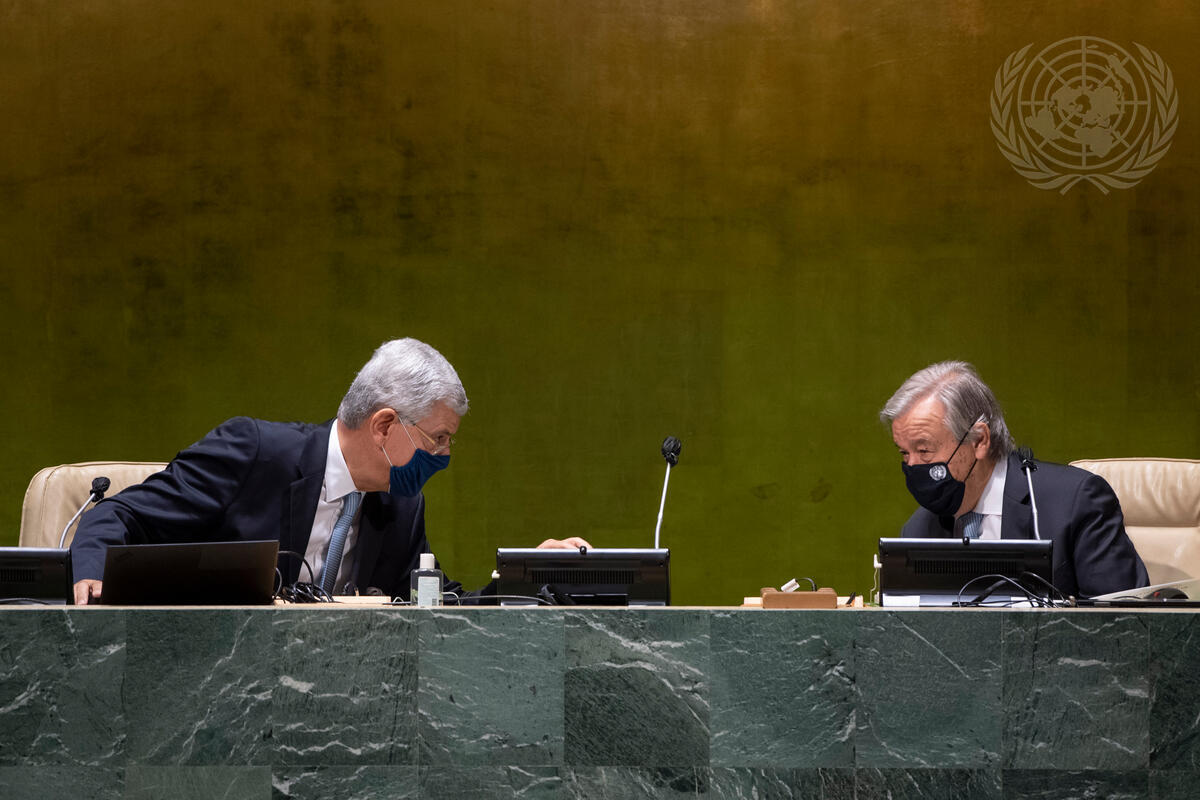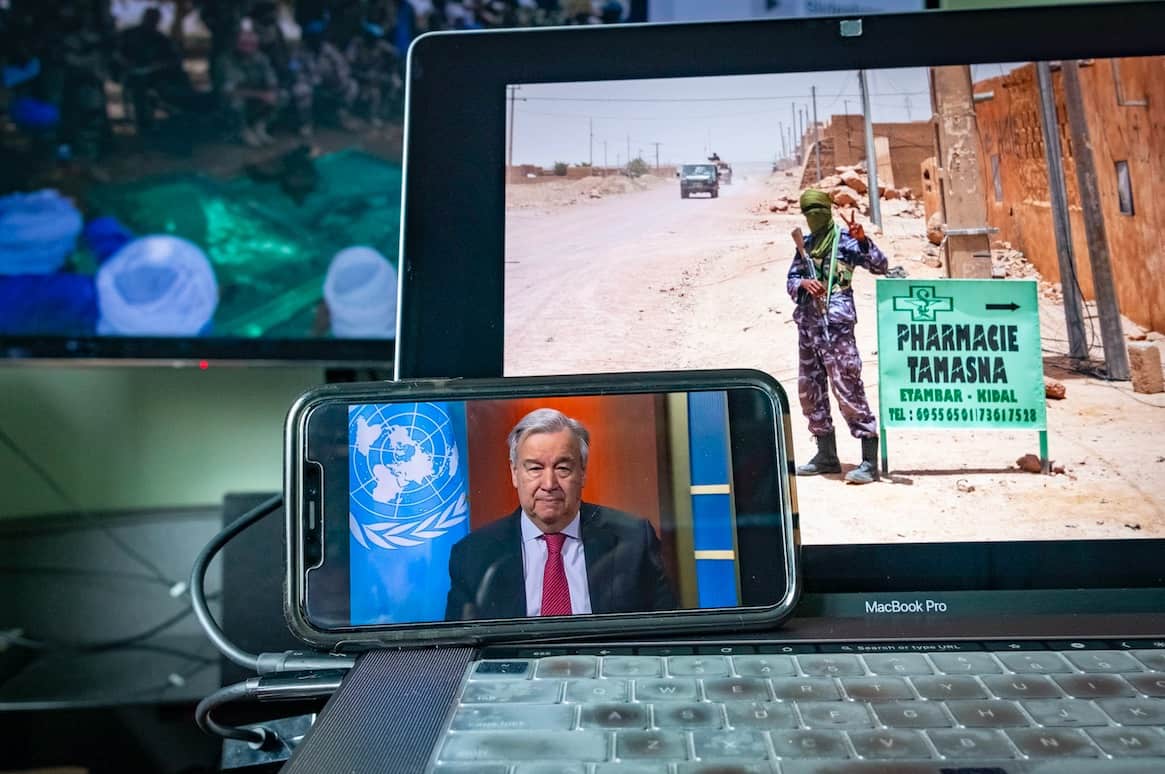Thalif Deen reports on a major cash crunch caused by late or non-payments amid the Covid-19 pandemic.

UN headquarters. (Flickr/Julien Chatelain)
By Thalif Deen
at UN Headquarters
Inter Press Service
![]() When the United Nations was struggling to cope with a cash crisis back in April 1996, one of the many drastic measures it undertook was to cut down on its staff.
When the United Nations was struggling to cope with a cash crisis back in April 1996, one of the many drastic measures it undertook was to cut down on its staff.
So, it took the path of corporate America, and ironically, for a cash-strapped institution, it offered a “golden handshake” — a severance pay of about $80,000 each — to those who would voluntarily leave the near-bankrupt organization.
And as immortalized in the title of Woody Allen’s 1969 Hollywood comedy hit: about 400 staffers decided to “take the money and run.”
Fast forward to October 2020.
In today’s context, says one Asian diplomat, the UN is not in a position to offer such hefty golden handshakes even to some of the highest-ranking officials — if they do volunteer to quit.
A “liquidity crisis” triggered by late or non-payment of assessed contributions by 61 member states — amounting to a staggering $5.1 billion shortfall — is now threatening to undermine both the mandate and world-wide operations.
As of Nov. 2, only 132 Member States (out of 193), have paid their regular budget assessments in full, according to the latest UN figures.
The warnings about the current cash crisis have come from three directions: Secretary-General Antonio Guterres; President of the General Assembly Volkan Bozkir; and the 134-member Group of 77, the largest single coalition of developing countries in the world body.

Volkan Bozkir (left), president of 75th UN General Assembly, with Secretary-General António Guterres, Oct. 26, 2020. (UN Photo, Eskinder Debebe)
When he introduced a proposed program budget for 2021 in mid-October, Guterres warned that “the liquidity crisis has not abated and severely hampers the organization’s ability to fulfil its obligations to the people we serve.”
“At this crucial time for our work, it bears repeating that the organization can only deliver on its mandates if member states meet their financial obligations in full and on time,” he declared.
The responsibility for day-to-day operations, currently under threat, falls squarely on the shoulders of an estimated global staff of about 32,417, according to the latest figures from the Chief Executives Board for Coordination, while the Secretariat staff in New York is estimated at over 3,000.
Prisca Chaoui, executive secretary of the 3,500-strong Staff Coordinating Council at the UN Office at Geneva (UNOG), told IPS: “Indeed management informed us they won’t allow extensions of contracts for more than two years, whereas the current rules allow for an extension up to five years.”
They have clearly indicated they wanted to reduce the liability of the organization, she said, pointing out there is a current “recruitment freeze which means nobody can be recruited and nobody can be promoted because of the liquidity crisis.”
“What we know is that there is an acute liquidity crisis but nobody has spoken yet about a financial crisis but we feel it is coming,” she added.
Economic Turmoil
All this is due to the fact that member states are facing economic turmoil, and it goes without saying that paying the UN won’t be their priority, she argued.
She also complained: “We regret that the budget cycle has moved from two years to one year making the organization negotiate the budget on a yearly basis. Before, we had two-year budget cycles, and this was more secure than the current situation, whereby the budget has to be negotiated every year.”
“While we understand the difficulties the organization is facing, we don’t agree on the attempts to make UN staff become like corporate employees. This goes against the principles of how independent civil servants function,” Chaoui said.

Secretary-General António Guterres holds a virtual press conference to promote a report on his call for a global cease-fire during the Covid-19 outbreak, April 3, 2020. (Loey Felipe, UN photo)
Guy Candusso, a former first vice-president of the New York UN Staff Union, told IPS “with all the uncertainty in the world now, I am not optimistic in the near term.”
In the long term, he said, the financial crisis will most likely work itself out. “In the meantime, I believe all staff will suffer and bear the burden of the cuts when the money runs out.”
When he introduced the “buy-out” early retirement program back in 1996, Joseph Connor, under-secretary-general for administration and management, said “there are too many people in this organization doing the same job for 20 years.”
Connors told reporters the United Nations had set aside about $15 million for the buyout program, under which the Secretariat had said goodbye to 400 employees. With more staffers expected to leave, he said, another $15 million would be sought through savings in the budget to allow for “early separation.”
The severance pay, averaging about $80,000 each, was based mostly on the number of years put in by staffers.
Asked whether he was concerned that some of the best staffers might be the ones accepting voluntary severance, Connor said that in such cases, then Secretary-General Boutros Boutros-Ghali would use his discretion and reject requests, as he has done in the past.
Group of 77
Speaking on behalf of the Group of 77 and China, Megayla Austin of Guyana told the UN’s Administrative and Budgetary Committee (also known as the Fifth Committee) last month, the G-77 notes the efforts of member states in fulfilling their financial obligations while overcoming the economic and financial difficulties during the Covid-19 pandemic.
However, “the Group also notes that the total amount of outstanding contributions and peacekeeping assessments exceeds $5.1 billion, as of Sept. 0, with the majority from one single member state.”
That single member state has been identified as the United States, the biggest single contributor to the UN budget.
Volkan Bozkir, president of the 75th Session of the General Assembly said Oct 28: “I could not address you today without touching on the important issue of the UN’s financial situation.”
The secretary-general has, “on several occasions, expressed to me concern about the financial situation of the UN and its ability to meet its ongoing financial obligations. I share these concerns and urge all member states to pay their dues in full and on time.”
During the high-level fortnight, he pointed out, the message from world leaders was clear: “International cooperation and effective multilateral action is essential to confront the pandemic. So, the United Nations needs a predictable financial basis to do that.”
Besides day-to-day operations, the UN may also lack funds for the implementation of its mandates.
When Guterres presented the proposed 2021 budget, he said: “to fully implement the mandates entrusted to us, the UN will require a total of $2.99 billion, which represents a net reduction of 2.8 per cent compared to last year, despite additional initiatives and mandated activities.” This includes a net decrease of 25 posts.
Richard Ponzio, senior fellow and director of the Stimson Center’s Just Security 2020 Program, told IPS that member states have a legal responsibility to pay their mutually agreed, assessed dues on time and in full each year.
“The world body’s severe financial crisis of recent years hampers its urgent, life-saving work, which has only intensified with the onset of the coronavirus pandemic.”
The United States and other countries that fail in their international treaty responsibilities are also failing to demonstrate leadership beyond their borders at a time of acute international need, he added.
Barbara Adams, chair of the board of Global Policy Forum, told IPS: “As you know this is not the first time the UN has been held hostage to over-dependence on one contributor.”
She said sustainable funding is essential if the other propositions and system-wide reform proposals are to have any success. However, the current patterns of funding are insufficient both in quantity and in quality.
“Sustainable funding is crucial for the ability of the UN to do what it was set up to do, but more pertinently, it is necessary to disconnect and break the current patterns that are dominated by a few large donors, and the way in which they are influencing decision-making, agenda setting and shaping priorities and skewing implementation across the system,” said Adams, a former associate director of the Quaker United Nations Office in New York (1981–1988).
Meanwhile, four member states have requested — and granted — exemptions under Article 19 of the Charter for the inability to pay their dues because of financial constraints.
The General Assembly agreed to the exempt Comoros, Sao Tome and Principe and Somalia from paying the full minimum amount necessary to avoid the application of Article 19 of the Charter because of “conditions beyond their control.” As a result, none of them will be penalized and will be permitted to vote in the General Assembly, until the end of its 75th session next year.
Thalif Deen is director & senior editor at the UN bureau of Inter Press Service (IPS) news agency. He has been covering the United Nations since the late 1970s. He can be contacted at thalifdeen@aol.com
This article is from Inter Press Service.
The views expressed are solely those of the author and may or may not reflect those of Consortium News.
Please Contribute to Consortium News
Donate securely with
Click on ‘Return to PayPal’ here.
Or securely by credit card or check by clicking the red button:



— This is not new: already in the Reagan-Thatcher years, the U.S. and British governments used their influence to impose a hiring freeze at UN agencies, so as to promote their ideological agenda.
— The other UN member states are also to blame. They could easily institute a reform of UN financing that reflects the current economic status of all countries, which would mean the USA and a few other Western countries would contribute a smaller share, and thus no longer have this excessive influence.
bullshit. Let it die. We need a real democratic governing consortium of national reps.
It would be the best solution to let this incompetent & expensive United Nations ‘Go Belly UP’. This has proven to be a political bureaucracy under control of USA as major contributor. Like they say:’ Whose bread ones eat, whose word one speaks!’